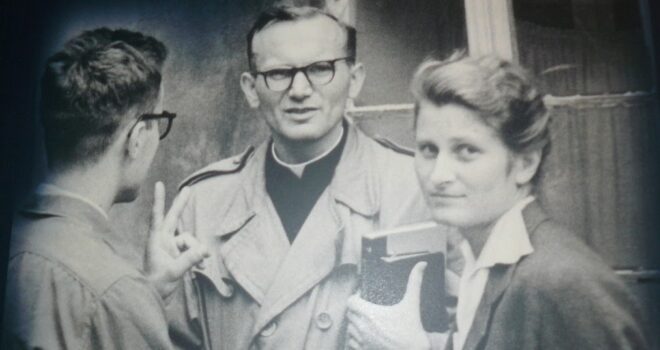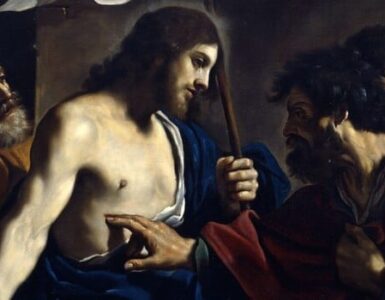Shortly before her 102nd birthday, on October 24, 2023, Wanda Poltawska passed into the next world. In the year 2021, when she became a centenarian, she joked to an interviewer that “For many people, I’m something of a museum piece!” Her modesty belied her history.
A museum is where things of great value are displayed so that they can be appreciated for years to come. Dr. Poltawka is a person who should be long remembered for her courage, her tenacity, her determination, and her inestimable contribution to the Catholic Church.
I had the distinct pleasure and honor of meeting this extraordinary human being at a private home. The year was 1990. The site was Toledo, Ohio. Wanda was on her way to Florida to visit one of her daughters. She related a series of extraordinary events to our small household gathering seated around the dining room table. We were most privileged and attentive to what she had to say.
In 1962, after being diagnosed as having throat cancer, doctors planned to subject her to a desperate medical procedure. The auxiliary bishop of Krakow, Karol Wojtyla, a close friend of Wanda, being very concerned about her condition, dispatched a letter to Padre Pio requesting his prayerful intervention: “Venerable Father, I ask that you pray for a forty-year-old mother of four girls, in Krakow, Poland (who during the last war spent five years in a concentration camp and possibly may die of cancer) that God may extend his mercy to this woman and her family in the presence of the Most Blessed Virgin. Most obligated in Christ, Karol Wojtyla.”
The now canonized Saint Padre Pio’s response was simple and reassuring: “To this request one cannot say, ‘no’.” He then asked the courier to save the letter “because one day it will become important”. The request proved prophetic. It was included in the canonization process when Karol Wojtyla was declared a saint of the Catholic Church.
Just prior to the scheduled surgery Wanda Poltawska’s health was miraculously restored. Could the cure have been the result of Padre Pio’s intercession? Being a psychiatrist, trained in science, Dr. Poltawska wanted some shred of proof. She traveled to Pietrelcina, where the Capuchin friar resided. She found herself standing outside of a church and asking a passerby where Padre Pio might be. She was told that she was standing outside of the very church where he was saying Mass. She entered the church and sat down. During the celebration of the Mass, Padre Pio looked directly at this pilgrim from Poland, conveying to her the assurance that she was the woman for whom he had prayed. It was a miraculous meeting of minds and hearts concerning another miraculous meeting.
There was an additional occasion when Wanda Poltawska came close to death. This time her life was saved thanks to a friend. While imprisoned in the Ravensbrück concentration camp, a doctor, presuming that she was dead, threw her onto a pile of corpses. She was subsequently rescued by a friend who had seen her move a finger.
She experienced unspeakable deprivation and suffering at Ravensbrück for nearly five years. During that period, she experienced hunger that she later described as “monstrous and indescribable”. Nonetheless, she never allowed herself to become less than who she is: “I must, simply must get the better of my hungry body. I will not stop being myself just because I am hungry,” she later wrote. However, once she was released, she was back in that dreadful camp of horrors in her dreams. When she was in prison she dreamed of being home; when she was home she dreamed of being in prison. On the advice of a psychiatrist, she exorcized her nightmares by writing about them. This process of purgation led to the publication of her book, And I am Afraid of My Dreams. In her Foreword to the book, which she translated, Mary Craig appraises it as conveying “a priceless insight into a dark period of human history which we might prefer to forget, but which it might be better to try to understand.”
While caring for a pregnant unmarried girl, she sought the help of a young priest by the name of Karol Wojtyla. It was the auspicious beginning of a lifelong friendship. When Wanda introduced her mother to Karol Wojtyla, she predicted that the young cleric would one day occupy the throne of Peter. Poltawska compared her friendship with the future pope with the spiritual bond that existed between St. Francis of Assisi and Saint Clare. Her association with John Paul II over the years was productive. She collaborated with him in his writing of Love and Responsibility and in was influential in his understanding of a true feminism which emphasizes the nature and dignity of women. When Wojtyla became Archbishop of Krakow, he founded a Family Institute in that city and placed Wanda Poltawska in charge.
Dr. Poltawska received her medical degree from Jagiellonian University in Krakow in 1951 and her doctorate in psychiatry in 1964. As a psychiatrist, she specialized in juvenile psychiatry. In this capacity she was able to help many of the unfortunate “Auschwitz children” who had been deeply traumatised in concentration camps.
It is impossible to think of Wanda Poltawska without thinking of God’s mercy. But it is also impossible to think of her and not to think of the human capacity for brutality. Dr. Poltawka is a powerful witness in our times that only through Christian heroism can we begin to make sense of life in the modern world.











